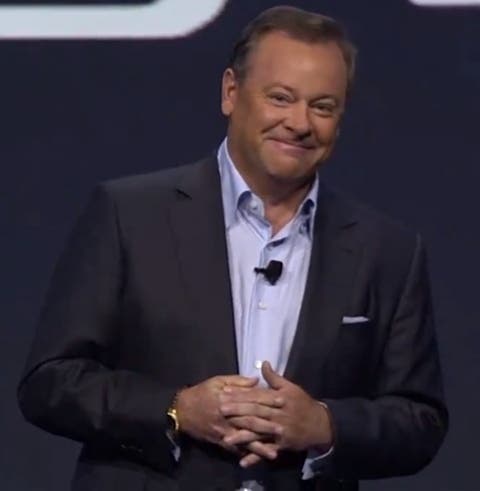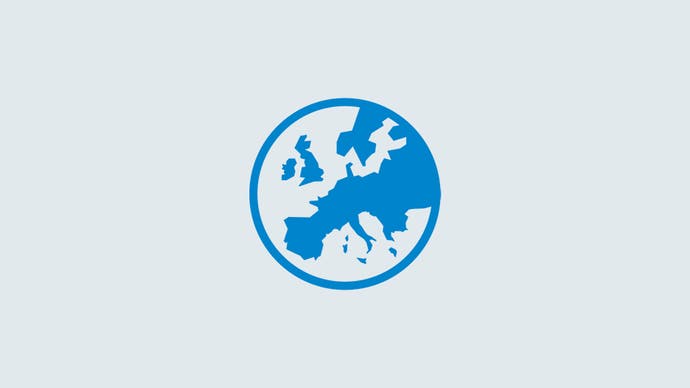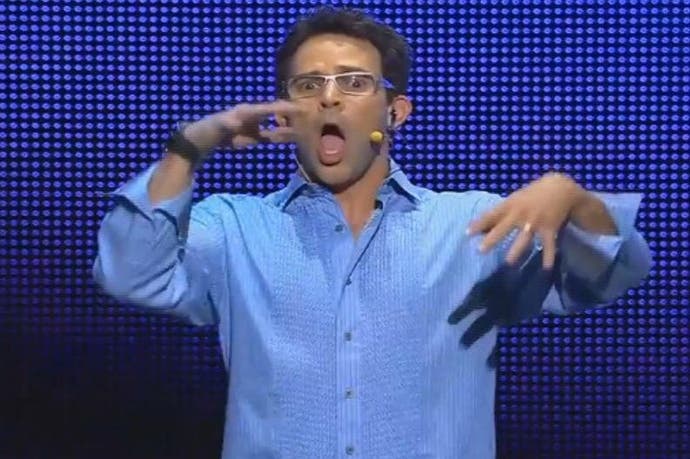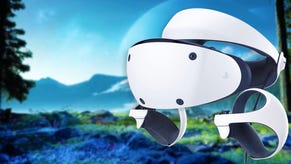The art of the E3 press conference
A handy guide for puzzled executives turned showbiz frontmen.
Picture this: you're a video game executive. Maybe you head up a big independent publisher, or maybe you steer the video game division of a massive global corporation. You're an accomplished and successful business person; you might also have a background in technology and engineering. You're very good at what you do. You can knock an investor call or a corporate restructuring or a complex contract negotiation out of the park. Need someone to network the hell out of that tech industry mixer? Want a pugnacious journalist stonewalled with befuddling newspeak? No sweat. You're the guy for the job.

Yet once a year - admittedly with the help of your large PR staff and their consultants - you find yourself responsible for staging a showbiz spectacular. Not only that, you have to take to the stage - which might be in some terrifying, cavernous sports arena on the outskirts of downtown Los Angeles - and front some of it. All of a sudden you're expected to be Vince McMahon and Ellen DeGeneres rolled into one. This is not your skill set.
"Press conference" is a vestigial euphemism for the macho marketing blowouts that Microsoft, Sony, EA and Ubisoft host at E3 early every summer. The currently favoured "media briefing" doesn't really cover it, either. These shows are on the verge of becoming entertainment properties in their own right. No longer genuinely held for the benefit of the press, they are now used to address consumers directly, streamed straight onto the living room TV via the appropriately branded games console. This year, Sony's event will be shown live in cinemas across North America.
They may be crass and nakedly commercial, and they may not serve the whole gaming community - barely even half of it, if we're honest - but these events are still the main global showcase for this vibrant entertainment industry. They're pure pageantry: a combination of competition, circus and storefront, the equivalent of the Oscars or the Superbowl. And fans love them for it. They're going to take the day off work or skive school or stay up all night to watch you. So you'd better nail it.
Never fear: Eurogamer is here to help, with the essential guide to the art of the E3 press conference, divided into 'Dos' and 'Don'ts'.
Dos
Do announce some new stuff.
Let us be crystal clear here. A new level, mode or character doesn't count. The first proper look at a previously announced game doesn't count. An annual sequel everyone knew was happening anyway doesn't count. We're talking new games that no-one knows about, new hardware, new features, new deals. They call it 'news' for a reason.
Don't tease it the week before. Your PR people will want to; they'll tell you it will build hype. Just tell them no. Don't show it to the press under embargo before the show. This might be convenient for you and them, but really, everyone loves a secret, and the hacks will be killing each other to be the first to see whatever it is. Yes, it might leak. It probably will. That will sting, but don't sulk, keep your trap shut, hold the press release and pretend it never happened. Until you open your mouth, it's just a rumour. This is how you win headlines.
Do own your personalities.
We get it, it's weird. You're no oil painting. You didn't get into this to be a presenter. E3 history is littered with senior executives humiliating themselves trying to be cool. Remember when Peter Moore cocked up Rock Band? You don't want that to happen to you. So we can see why you'd think about leaving it all to a professional compere.
But consider this. Did any executive ever fail as hard as Jamie Kennedy for Activision in 2007? And where's Mr Caffeine now? Gently rocking back and forth in the corner of a Montreal bedsit, that's where. Meanwhile, Kaz Hirai may have suffered indignity after indignity at the infamous Sony presser of 2006, yet eight years later he's the King of All Sony and people make GIFs of his face photoshopped onto Antonio Banderas. He is a hero to millions.
The point is, your fans haven't tuned in to watch the standup comedian you hired. They want to see you. (Unless you're Don Mattrick.) And you don't have to be a slick salesman like Moore or Jack Tretton to pull it off, either; Nintendo fans have even turned that dead-eyed bruiser Reggie Fils-Aime into a lovable mascot. Find the personalities in your business that people respond to - for whatever reason - and use them on stage, and just maybe, one day, you'll get to have a moment like this:
Do price it and date it.
If you're announcing a game, tell everyone when it will be out. (You can always delay it later.) If you've got a new console, say how much it will cost. If you don't have any new hardware, cut the price of an existing console. If you can't cut the price, put it in a new case and price it the same, or bundle it with something else and price that. Whatever you do, for the love of God, don't leave the stage without saying that you will have a product for sale at a definite point in the future and you know how much you're going to ask for it. This is your bargain with the audience. They will be willing to sit through a 90-minute commercial for your company, and in return they want just one thing: they want you to make it real. It's pretty reasonable, when you think about it.
In 1995, at CES - the year of the first E3 - Sony's Steve Race knew the score. Those three numbers were all anyone wanted to hear.
Do phone up Konami and get a Metal Gear trailer.
Everyone else will be doing this, so you'll have to get your wallet out. Just grit your teeth and pay whatever it takes. Metal Gear trailers are E3. They cannot be beaten for wit, spectacle, panache and a sense of occasion, and they do it all with a classy, nonchalant air that the bombastic try-hards from the bigger publishers (and your own internal studios) can't hope to match.
Plus, you get Hideo Kojima introducing it on stage as part of the package. He won't say much, he'll just stand there smiling gnomically. Doesn't matter. It's the equivalent of having Bob Dylan play your daughter's birthday. There is no bigger legend - apart from Miyamoto, of course, and he's not on the open market. (If you are actually Konami: sorry, you can't afford your own trailer.)
Don't believe us? This Metal Gear Solid 2 trailer, from E3 2000, pretty much won an entire generation for Sony:
Don'ts
Don't let it run over 90 minutes.
Seriously. Sony, we're looking at you. This thing is still over two hours long. Someone's going to have to talk to David Cage about his dramatic pauses.
Don't fake it.
In 2005, Sony showed a stunning trailer for Killzone 2 (below) and tried to pass it off as genuine PS3 gameplay. It was no such thing. It was pre-rendered target footage cooked up by the developer, Guerrilla. The media questioned it and executives stuck to the party line, trying to capitalise on the trailer's wow factor to generate positive buzz around PS3. The media questioned harder and the lie collapsed, doing far more damage to PS3 than it had done good - of course - and severely damaging the reputation of a talented first-party studio to boot.
You don't need us to explain this to you. It's a simple cautionary tale. You will be found out, and it won't be worth it. So don't fake it. (Unless the batteries in the controller run out, in which case, switch to video, stat! But try to remember to charge the controllers first, OK?)
Don't do your passion projects.
Pay attention, because this one is really, really important. All those projects you started because you liked the synergies, or because they were good for you politically, or because they would play well with shareholders, or because you did that awesome deal with the guy from Nike in Vegas that time, or because you understand that convergence is totally a big deal, even if you're not sure what it is: don't mention them at all.
Constantly ask yourself this question: is it a video game, or directly related to the playing of video games? No? Then bin it. Even if Steven Spielberg or Beyonce or Barack Obama says they'll come on stage to endorse it personally, bin it. If it's to do with fitness or video calling or streaming movies or smartphones, bin it. If it's a web browser, sack whoever suggested it, sack whoever hired that person, and then bin it. Look, there's a place for all this stuff in your business plan, we get that. There's just no place for it at E3.
(Oh, and handheld video games should get 15 minutes, max. Sorry. We know it's unfair. I'm sure the Vita team will be very disappointed. We kind of wish it was different too. But this is E3, and them's the rules.)
Don't get carried away.
You might be tempted by the captive audience, the competitive pressure and the glare of the limelight to try some really dramatic grand gesture. Whilst we encourage you to be as surprising as possible and hold as much back for the show as you can, there are limits - and what plays well in the hotel bars of LA that week doesn't necessarily swing it in the real world. In 2010, Microsoft gave an Xbox 360 away to every attendee of its press conference. It looked grubby (although there's an argument that, given the failure rate of most journalists' early 360s, they were just saving everyone time and hassle). More to the point, it was much more expensive than it was worth and it only excluded the people who really mattered - the gamers at home.

Nothing, however, can top Sega's announcement, at the first E3 in 1995, that it would be releasing the Saturn console four months early - on the very same day. It was a moment of complete elation for every Sega fan and a buzz for journalists; it's been the stuff of every fanboy's E3 fever dream for the last 20 years. But it famously backfired, as the console launched without enough stock or games and jilted retailers withdrew their support. Remember: E3 is a big deal, but it's not that big a deal.
Don't let it get too slick.
This is perhaps the hardest part of all. If you follow every one of these rules and hone your show until it's a flawless bit of showbusiness, it won't necessarily work. If there's not one missed cue or fluffed line, if it's too polished, too professional - if it really is indistinguishable from the Grammys or WrestleMania - you run the risk of losing your audience.
Video games are big business, but they're still scrappy, still geeky, still disreputable; they still have a faint tang of subculture. Every year they come to Hollywood's backyard to strut their stuff, and every year you can tell that they're faking it nervously in front of the big boys. Even Microsoft can't pull it off without the mask slipping and a little bit of class nerd peeking out. Your audience knows this and they'll mock you for it openly yet love you for it secretly. They'll immortalise you in memes. They want you to entertain them, but they also want you to be awkward and weird, just like they are. The games business is kind of impersonal, and E3, despite its overbearing hubris - or perhaps because of it - is a chance for it to show its human side.
So take off that tie and get ready to make a total idiot of yourself. Trust us. It'll be fine.



-3-31-23-screenshot.png?width=291&height=164&fit=crop&quality=80&format=jpg&auto=webp)





